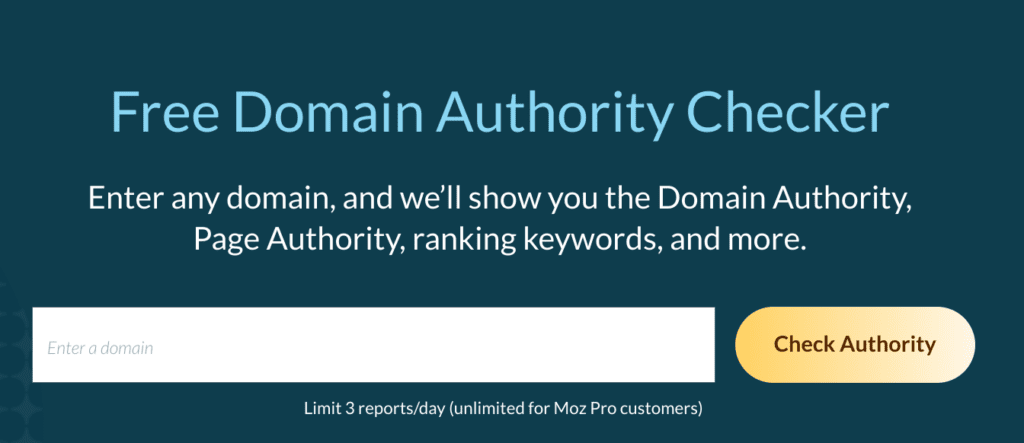Do you want to know how to increase your website domain authority (DA)?
If you work in SEO, you’ll likely use a range of third-party metrics to help guide you on your SEO strategies, with DA being one of the most popular among those in the industry.
In this article, we’ll take a look at what DA is, how it’s calculated, why it’s important, how link building can increase it, and what you can do to help increase your site’s domain authority.
At Embryo, our SEO team carries out in-depth research to execute high-quality SEO strategies that will help improve our clients’ organic performance and in turn, improve their DA from our SEO efforts.
What is Domain Authority?
DA is a numerical figure that was created by Moz and is used by those in the SEO industry to predict the likelihood of how well your site will rank in Google’s search results.
DA is calculated by using a range of metrics to give your site a score of 0-100 (we’ll dive deeper into this in the next section of this article). One of the main metrics Moz uses when calculating a site’s DA is the quality and quantity of linking domains.
With Moz using a DA scoring system of 0-100, if your website has a DA of 0 then it would be incredibly difficult for the website to rank well for target terms in that particular industry. Contrastingly, a DA of 100 means that your website has a very good chance of ranking well in the SERPs for competitive terms.
It’s important to understand that DA is a score given to the entirety of a website rather than the performance of specific pages. Despite DA being a popular metric that SEOs review when looking at a domain’s strength, you’ll be surprised to know that it has no connection with Google’s ranking algorithm. However, there is a strong correlation between DA and organic performance which is useful for giving SEOs some guidance when it comes to planning out strategic direction.
How is DA Calculated?

Now we have a clearer understanding of what DA is, let’s dig into how Moz calculates it.
Several factors contribute to the calculation of a site’s DA, however, as discussed above, the quality and quantity of linking domains are heavily used when calculating the DA of a site.
From a linking domains perspective, it’s best to have a range of unique, relevant backlinks pointing back to your site from high-quality sources, rather than receiving a high quantity of referring domains from the same domain.
For example, if site A has 100 high-quality backlinks from 3 domains but site B has 100 high-quality backlinks from 90 domains, then site B is likely to have a higher DA.
Therefore, if a site has a high DA you can confidently conclude that it has a strong backlink profile both in terms of quality and quantity.
Spam score is also likely to be utilised when calculating a site’s DA, therefore, it’s important to keep this as low as possible and focus on earning high-quality, relevant links that will positively influence your DA.
As well as this, your site’s overall SEO performance and quality of content is factored in when calculating your DA score. Therefore, it is important to ensure your pages are fully optimised and that your content is unique, insightful and up to date.
Here is a document from Moz that provides further details on its authority scoring. It’s important to note that Moz does update its authority scoring system, so it’s best to compare this with competitors in your industry if you see any fluctuations.
Why is DA important?
Despite not being connected to Google, DA does still have some importance to those who work in SEO. These are as follows:
Provides strategic direction
As the DA of a site helps us to determine how likely a site is to rank in the Google search results, SEOs can use this metric to help them decide on key focus areas that they should be targeting in their strategies.
To put this into context, if your site has a DA of, for example, 10 then it’s unlikely that the site will be able to compete for keywords where Google’s first page results are dominated by, for example, DA 70+ sites.
Backlink health overview
As backlink profile health is one of the main contributors to calculating a site’s DA, SEOs can use the metric as a useful way of providing insight into the quality and quantity of referring domains a site has.
Strong correlation performance signals
Overall, SEOs often see a strong correlation between sites with a high DA, the site’s ranking position in Google and ultimately the amount of organic traffic the site receives. Therefore, DA is important for giving you a top-level overview of organic performance.
It’s also useful to use DA as a benchmark to track your SEO progress. For example, if you see your website’s DA increasing then you can confidently say that your SEO efforts are having a positive impact.
Provides competitor comparisons
Finally, DA is important as it helps to provide a top-level numerical overview of how your site compares to competitors in the industry. For example, if you notice that your competitors’ DA is increasing quicker than yours, then you’ll likely carry out some competitor research to see why this could be the case. Alternatively, if you see that your competitors’ DA is decreasing but your site’s DA is increasing, then you’ll know that what you are doing is likely to be working.
Four ways to increase domain authority
We’ve looked at what DA is, how it’s calculated and why it’s important, now it’s time to see how you can increase your DA.
1. Improve DA through backlinks
Earning high-quality, relevant, unique referring domains is a great way to build your website’s DA. You can naturally earn backlinks to your domain by creating highly engaging content. I normally find that data/statistical content pieces work best for passively building backlinks over time, and tend to attract links from sites that have healthy traffic levels.
I would also recommend looking for any ‘quick wins’ that you could take advantage of such as 301 redirecting 404 pages with referring domains to other pages on your site, or chasing up any unlinked mentions of your brand on the web.
2. High-quality content creation
Producing high-quality content that contains unique data and insights is great from an EEAT perspective. Not only does it showcase your industry expertise and differentiate your content from competing pieces, but creating content with recent data is great for naturally obtaining links to your site.
I’d recommend reviewing your existing content to see which pieces are generating the most links as this could provide a strategic direction for your future pieces.
3. Spam score audit
As we’ve covered, you can increase your DA by building high-quality, relevant backlinks. All this hard work can be reversed if you have a high number of low-quality linking domains to your site.
Therefore, it’s important to carry out a spam score audit as the linking domains that have high spam scores could harm your overall DA. As such, it is key to review these sites so that you can determine whether they are toxic ‘black-hat’ links that you’d prefer to be removed from your backlink profile.
4. Clean up your on-page SEO
Another great way to improve your DA is to tidy up your site’s on-page SEO – from correct header structures to optimised page titles and meta descriptions. These all influence your DA.
More importantly, having a site that’s set up well through internal linking is one of the best ways to increase your DA, not only will this help crawlers and users navigate your site. It also provides you the chance to pass ‘link juice’ throughout your site to further boost organic performance on those pages.
A word from the expert: Our CIO, James Welch, says:

“Increased domain authority is a direct consequence of attracting inbound links from external websites. The more established and useful the site you receive a link from, the likelihood is that this will add a stronger amount of authority.
Ensuring that internal linking is done proficiently across your own site should prove helpful to increasing domain authority too, as it is likely that the flow of ‘link juice’ from external links will travel around your own site better.
Of course, to attain links without asking for them in any way will usually be because you have produced excellent content on your own site. Excellent content is usually the constant of a website with a strong domain authority.”
Interested in improving your DA?
After reading our article on how to increase domain authority, hopefully, you’ll have a clearer understanding of what it is, how it’s calculated, why it’s important and ultimately, how to increase it.
If you’d like more guidance on how to increase your website’s domain authority score, then feel free to get in touch with the team at Embryo by phone at 0161 327 2635 or email info@embryo.com.
FAQs
Answered by Amy Leach
Is Domain authority the most important analytical figure?
It is key to remember that domain authority is a third-party analytical figure. DA is a figure which tries to replicate and understand Google’s algorithms and put it into a single number. Domain authority is best understood in the context of competitors in your industry.
What is a ‘good’ vs ‘excellent’ Domain Authority score?
This is dependent on the industry. For example, Wikipedia is in the high 90s. It isn’t realistic for a small local business to aim for this same DA, so excellent for this may be in the 30-40 range.
How fast can Domain Authority increase?
Domain Authority can increase fairly quickly if you are carrying out a well-planned and structured SEO strategy. While DA is a useful metric, this shouldn’t be the only end goal of your website growth.












